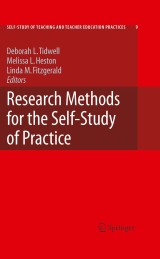Details

Research Methods for the Self-Study of Practice
Self-Study of Teaching and Teacher Education Practices, Band 9
|
CHF 189.00 |
|
| Verlag: | Springer |
| Format: | |
| Veröffentl.: | 12.06.2009 |
| ISBN/EAN: | 9781402095146 |
| Sprache: | englisch |
| Anzahl Seiten: | 250 |
Dieses eBook enthält ein Wasserzeichen.
Beschreibungen
Self-Study Through the Use of Text.- Co/autoethnography: Exploring Our Teaching Selves Collaboratively.- Teaching and Learning Through Narrative Inquiry.- Passages: Improving Teacher Education Through Narrative Self-Study.- Self-Study Through Discourse and Dialogue.- Talking Teaching and Learning: Using Dialogue in Self-Study.- “Name It and Claim It”: The Methodology of Self-Study as Social Justice Teacher Education.- Many Miles and Many Emails: Using Electronic Technologies in Self-Study to Think About, Refine and Reframe Practice.- Self-Study Through Visual Representation.- Faces and Spaces and Doing Research.- Facing the Public: Using Photography for Self-Study and Social Action.- Making Meaning of Practice through Visual Metaphor.- Creating Representations: Using Collage in Self-study.- Self-Study on the Impact of Practice on Students.- How Do I Influence the Generation of Living Educational Theories for Personal and Social Accountability in Improving Practice? Using a Living Theory Methodology in Improving Educational Practice.- Assumption Interrogation: An Insight into a Self-Study Researcher’s Pedagogical Frame.- Teacher Education for Literacy Teaching: Research at the Personal, Institutional, and Collective Levels.
<P>This volume presents 13 studies that provide concrete and authentic illustrations of self-study as it naturally unfolds across different educational settings. Each chapter provides in-depth descriptions of the context, method choices and processes used for self-study research, highlighting how researchers gather, analyze and make sense of data. All of these studies offer rich examples of the recursive processes so important in self-study research. The first section highlights the use of text as data to examine the meaning and value of teacher education practices. The second features self-studies using discourse and dialogue as data and often as actual analysis tools for examining practice. The third presents studies in which different forms of visual representations are used as data that illuminate the ideas, assumptions and experiences underlying practice. The final section presents self-studies focused on the impact of practice on teacher education programs, students, and faculty-student interactions.</P>
Unlike methods for doing traditional research, the self-study methods are both the phenomenon under study and the method of researching oneself and others Provides concrete illustrations of both verbal and visual data collection and analysis in self-study methodology in a variety of contexts Richly describes the interdependence among researchers, contexts and methods Illustrates different developmental levels in the self-study methodology

















